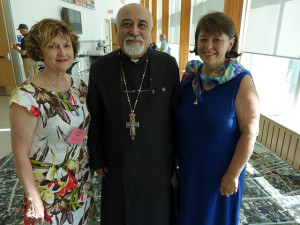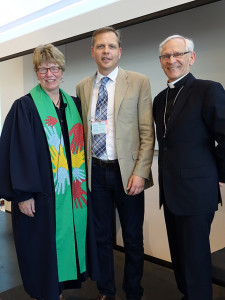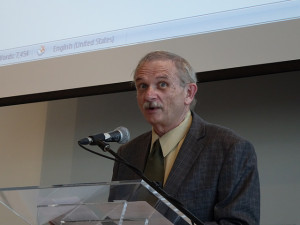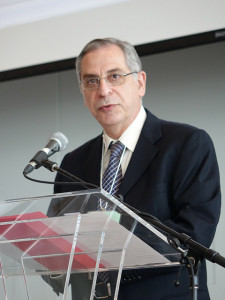Process to Address Overtures on Human Sexuality
As part of the process to address two dozen overtures related to human sexuality, the assembly set aside times for discernment and sharing on Saturday afternoon.
In preparation for a time of private discussion at table groups, Moderator Karen Horst asked commissioners to “listen generously.”
“Be the author of your story,” she said. “No one’s story is worthless. Everyone has something to share and your place here is worthwhile.”
In the groups, commissioners passed a shell around the circle, giving each person an opportunity to speak as they held the shell. They were asked to respond to four questions:
- When you consider the issues around human sexuality and sexual orientation in the PCC, what do you most hope for?
- When you consider the issues around human sexuality and sexual orientation in the PCC, what are your greatest fears?
- What, for you, are the greatest issues/concerns around human sexuality and sexual orientation? How have these issues impacted or affected your own life and relationships, or conversations you have had? What feelings do you have about these impacts?
- What qualities and values of the gospel should we try to express in considering the issues of human sexuality and sexual orientation in the PCC?
At the end of the time, each group wrote down five or six things they wished to share publically. These were taped up on boards around the room.
The process will continue on Sunday.
Assembly Council
The Assembly Council, the group which carries on the work of the General Assembly throughout the year, presented a plan to revise its membership and terms of reference to shrink the number of members on the council and change how members are appointed.
Commissioner Ian Shaw moved an amendment asking that the proposals be referred to the courts of the church for consultation and comment. It’s a significant enough change being recommended that it’s worth a consultation process, he said.
The amendment was carried. Sessions, presbyteries and synods will be asked to consider and comment back to the Assembly Council on its proposal by Jan. 31, 2016.
Other recommendations included translating Leading With Care, the church’s policy on preventing and responding to allegations of sexual abuse and harassment, into French and reducing the number of Women’s Missionary Society representatives on the Life and Mission Agency Committee from two people to one person. All the recommendations were approved.
An additional motion, which as amended on the floor, asked that some wording in a portion of the Book of Forms be changed to ensure congregations agree to “agree to adjust the stipend and allowances annually in view of any changes in the cost of living and the needs of our minster” and “and that this be sent to sessions and presbyteries for study and report to the next General Assembly by January 31, 2016.”
The motion was motivated by a portion of the council’s report—which responded to an overture—about the need for congregations to increase the housing allowance they provide to their ministers as the cost of living increases over time.
Another additional motion from Rev. Peter Bush of the Presbytery of Winnipeg asked “that the Assembly Council develop a plan to implement the recommendations of the Truth and Reconciliation Commission related to church apologies and reconciliation throughout the committees, agencies and departments of The Presbyterian Church in Canada and the synods, presbyteries and congregations, and to report to the 142nd General Assembly on the plan and the progress made.” The TRC released its recommendations on June 3 as part of a final event in Ottawa.
The assembly thanked the Presbytery of east Toronto for its invitation to host the 2016 General Assembly within its bounds, and accepted the resignation of Stephen Roche, Chief Financial Officer, effective Jan. 31, 2017. The council was authorized to call for nominations for the CFO position.
Ecumenical Visitor – Rev. Dr. George Sabra
Rev. Dr. George Sabra, professor of systematic theology at the Near east School of Theology in Beirut, Lebanon, offered his greetings and asked those gathered for their prayers and support.
I stand before you as a Christian from a region of the world often called the Middle East, he said. “A region of the world in which Christians are disappearing.”
“Of course others, non-Christians, are also suffering,” he continued, “but we are more at risk because our numbers are smaller to begin with and because in some places Christians are targeted because they are Christians.”
“If Christian witness disappears from the part of the world, the gospel of love, peace and reconciliation will disappear, too. To remain and witness to the gospel in our lives in our words and deeds and institutions, we also ask for your support. We know from our experience of the past that we Christians of the Middle East cannot on our own remain and fulfill our mission without the support of the worldwide church.”
International Affairs Committee
The committee’s report focused on numerous international issues, including religious persecution in India; the global situation of refugees, including the millions of people displaced by the conflict in Syria; the Millennium Development Goals (a 15-year global initiative to reduce poverty by the end of 2015); the global Arms Trade Treaty, including the 2014 $15 billion sale of light armoured vehicles to Saudi Arabia by London, Ontario-based General Dynamics Land Systems Canada; and an update on the shareholder dialogue between the PCC and Goldcorp regarding the Marlin mine in Guatemala.
The report included 11 recommendations asking the Moderator of the 141st General Assembly to write to the pertinent governments and global bodies about these issues, as well as asking the church to pray for all people being persecuted. All recommendations were carried.
Reflection from Rev. Dr. Stephen Farris
The moderator of the 140th General Assembly talked about a park area next to the University of British Columbia. The park contains many tree stumps, the ruins of mature trees cut down long ago. Yet new trees grow from the stumps of the old.
“They are called nurse trees,” said Farris, “with new life coming from the stumps. New life from what some may see as only a ruin. I have seen more than stumps; I have seen the promise of new life.”
“I have been to churches that are growing; that are flourishing, that are welcoming new people in,” he continued, talking about churches he visited during his year as moderator. He noted that he has “seen new life in churches that remain small.”
“You don’t need to be a big church to engage in Christian service. … You don’t have to be a huge church to see new life in love. I visited a church that has since closed, and more may close, but that’s no reason not to love and to serve in the meantime. Even from those stumps, the Lord God, giver of life, can make new life to come. And I’ve seen it with my own eyes. Thanks be to God.”
Ecumenical and Interfaith Relations Committee
The Ecumenical and Interfaith Relations Committee offered two recommendations. The first expressed thanks to the churches, presbyteries and committees that studied and responded to The Church: Towards a Common Vision and Together Towards Life: Mission and Evangelism in Changing Landscapes, and commended the documents for ongoing study and use.
The two documents were prepared by international ecumenical groups, and the World Council of Churches—of which the Presbyterian Church in Canada is a member—asked its member churches to consider them and provide feedback.
The second recommendation sought to revise the committee’s terms of reference. The proposed wording was amended slightly on the floor, and assembly agreed to add “to encourage Presbyterians to acknowledge, understand and appreciate the strengths of other faith traditions, and to help Presbyterians to live in good relationship with persons who belong to other religions” to the committee’s terms of reference.
The assembly also passed an additional motion asking the Moderator to extend its greetings to the United Church of Canada on the occasion of its 90th anniversary.
Clerks of Assembly
The report of the clerks began with a poignant video of Rev. Dr. Tony Plomp, one of the church’s deputy clerks. In it he shared a diagnosis of stage four cancer, which is incurable, he said. He thanked his “clerky colleagues,” and spoke of some of the people with whom he had served for many years.
He quoted the first question and response of the Heidelberg Catechism which he said he still membered from childhood and which gave him hope:
“Question: What is your only comfort in life and death? Answer: That I am not my own, but belong—body and soul, in life and death—to my faithful Saviour, Jesus Christ.”
Following the video the Moderator paused to pray for Plomp in his living and his dying, and for the clerks.
Their report included six recommendations, all of which passed without debate. Four offered responses to overtures referred to them in previous years, and two made minor changes to terms in the Book of Forms to bring them into line with the more commonly used words.
 Ecumenical Visitor – Rev. Fr. Keghart Garabedian
Ecumenical Visitor – Rev. Fr. Keghart Garabedian
Fr. Keghart Garbedian is pastor of St. Vartan Armenian Apostolic Church in Vancouver. He was born and raised in Bagdad and studied in Echmiadzin, Armenia.
He shared some information about the faith history of Armenia—a land referred to as the land of Ararat in 1 Kings and Isaiah, he said.
Armenia—both historical Armenia and the modern country—is full of churches, monasteries, chapels and statues. “Ninety per cent of historic Armenia is occupied by Turkey,” he said. He spoke of the Armenian Genocide, the Ottoman government’s systematic killing of Armenians 100 years ago, and Turkey’s refusal to recognize it as a genocide.
Special Committee on the Optional Elimination of Synods
In response to an overture in 2013, a special committee was struck “to develop a means by which a synod could choose to be dissolved and have its responsibilities fulfilled by some other structure.” In their report, the special committee recommended that synods be permitted to dissolve subject to approval of appropriate changes to the Book of Forms, and offered some proposed legislation to be remitted to presbyteries under the Barrier Act.
Changes to the Book of Forms require a study and report process. Changes to legislation must be approved by a General Assembly, remitted to presbyteries for their approval under the Barrier Act, and then endorsed by a second General Assembly.
Committee on Church Doctrine
The assembly affirmed “that ordained ministers of churches which are members of the World Communion of Reformed Churches are permitted to preside at the Lord’s Table at the discretion of the moderator or interim moderator of the relevant session.”
The document Living in God’s Mission today has been commended for use by various groups in the church, and sessions, presbyteries and other groups “report comments to the Committee on Church Doctrine through the Clerks of Assembly by May 31, 2016, and that the results of these comments be reported to the General Assembly in 2017.”
 New General Secretary of the Life and Mission Agency
New General Secretary of the Life and Mission Agency
The assembly endorsed the appointment of Rev. Ian McDonald, currently associate secretary of Canadian Ministries, to succeed Rev. Dr. Rick Fee as general secretary of the LMA.
In some short remarks to the court, McDonald said in his work he sees many good things being done across the church “and I don’t know if we speak often enough about the good that’s there in front of our eyes.” He called for courage. “Renewal doesn’t happen easily,” he said. “Pilgrimage is not painless.” But we have an encourager, he said. Like the disciples in the storm on the Sea of Galilee, we have Jesus in the boat with us.
 Dr. Rick Allen, PCC missionary with the Presbyterian Church if East Africa, Kenya
Dr. Rick Allen, PCC missionary with the Presbyterian Church if East Africa, Kenya
Dr. Rick Allen will be retiring after 35 years of service in Kenya, working in community health and preventative care. Specifically, Allen has been instrumental in helping the church develop a new and progressive policy on HIV/AIDS; a policy that is recognized as one of the best on the continent. In Kenya, 1.5 million people are infected with HIV/AIDS, and Allen’s care, work and contribution has resulted in better care for these individuals, improved access to services, and education and advocacy in churches and communities that has helped change opinions and dispel myths about the disease.
“I have had a unique opportunity to work with people of different religions and cultures,” said Allen. “Whenever I went to a new country, I wondered if I would be accepted. But I always found the people to be friendly, to have a sense of humour and they seemed to be understanding when I did things in a culturally awkward way.
“People who have had the opportunity to work in different cultures and countries will say they have received much more than they have given. In my case, that is certainly true. I wish to thank the church, both here in Canada and overseas, for this great opportunity to serve in Christian ministry.”
Ecumenical Visitor – Rev. Patrick Thegu Mutahi
Rev. Mutahi is the deputy secretary general of the Presbyterian Church of East Africa in Kenya, and also serves as the Secretary of that church’s Health Board. For the past three years, he has worked with the PCC’s Dr. Rick Allen.
He noted that Allen first arrived in Kenya when there were 600 people dying a day from HIV/AIDS. “It was a disease of mystery. They believed people died due to a result of sin, witchcraft and generational curses. But Dr. Rick Allen and the church worked together and developed a program that de-mystified HIV and AIDS. … We feel greatly indebted to the PCC much as we are sad that Dr. Allen is retiring.”
He noted that there is still much work to be done, and there are many issues facing Kenya today—one is insecurity. “We are under attack,” he said, noting the massacre of 148 university students last April. “We need your prayers and support.”
Mutahi also shared the fact that there are many ways the PCC can learn from the church in Kenya, noting they are not able to train enough minsters to meet the needs of our parishes.
“Dr. Allen, Kenya is your home. You are still welcome anytime and anywhere. Come and visit us, and the rest of you, too.”


